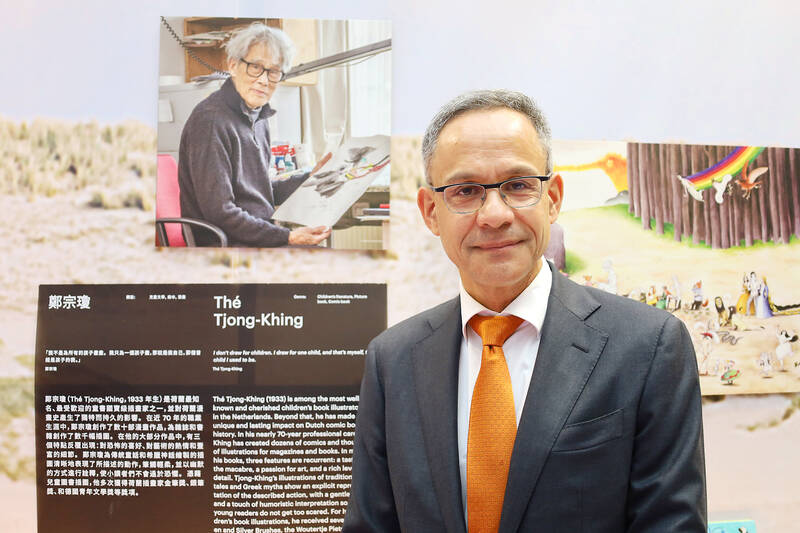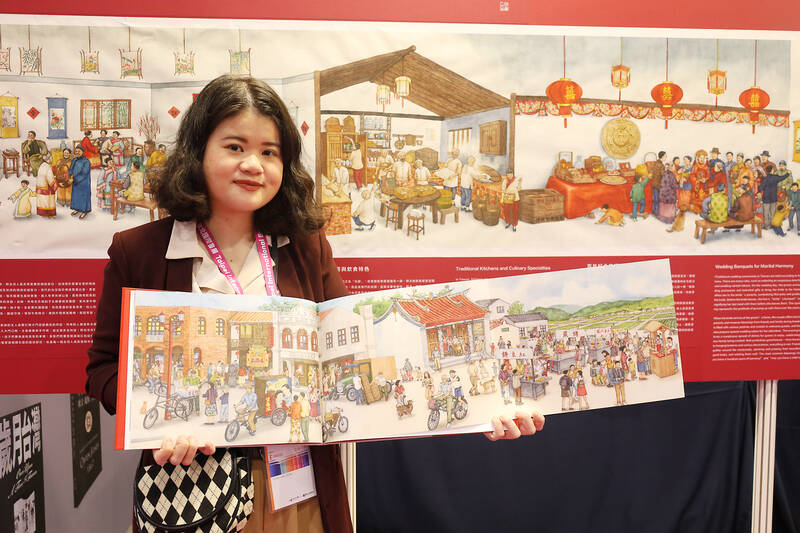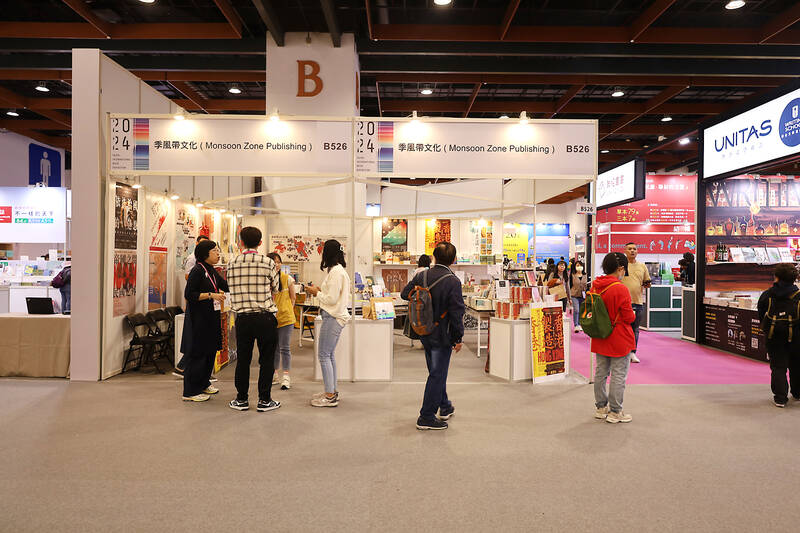“You need to input your information here,” explains Ariel Hsiao (蕭嘉韋), project director at design platform IF Plus, directing me to a smart screen that is part of a digital installation pavilion. I’m asked questions like my name and email address, who would be my partner (I choose a monkey) and what I’d do in certain situations. Once imputed, a book cover appears on a large digital screen depicting an avatar of myself hiking in the woods in the company of my new simian friend above the title Beyond Dreams.
“The AI generated novel will be sent to you within 10 days,” she explains.
“Really!” I say, “It took me 10 years to complete my book.”

Photo: Thomas Bird, Taipei Times
But this is the accelerated age of AI, and its implications for the business of storytelling is all the talk at this year’s Taipei International Book Exhibition (TiBE).
Academia Sinica (中央研究院) has decorated its pavilion with sci-fi digital fonts proclaiming “The age of AI has begun. Now loading…” and has scheduled a number of lectures on the topic for the duration of the book expo, which runs through Sunday at the Taipei World Trade Center.
E-readers are also prominently displayed, challenging traditional analogue books with interactive screens, audio capabilities, stylus pens and other features.

Photo: Thomas Bird, Taipei Times
Domestic brand BOOX (文石BOOX) is using the occasion to showcase some of its latest reading tablets, with the stated aim of “jointly exploring the infinite possibilities of digital reading.”
Another Taiwanese e-reader giving Amazon’s Kindle a run for its money is Hyrease Gaze, the company’s stylish new model Mini C attracting a lot attention from younger expo attendees who delight in the color displays the ultra-lightweight device can generate.
PRINT AND PAPER

Photo: Thomas Bird, Taipei Times
Beyond the neon gaze of tech firms, however, it seems the classic book is nowhere near extinction, and TiBE has attracted plenty of booksellers, importers and publishers, keenly promoting more traditional forms of literary nourishment.
Penang-born, Singapore-based doctor and booklover Lim Wooi-Tee (林韋地) is showcasing some of the Southeast Asia and Chinese diaspora books Monsoon Zone Publishing (季風帶出版) is making available in Taiwan, as well as Chinese-language versions of prominent foreign books like Peter E. Hamilton’s Made in Hong Kong.
Lim says he registered his business in Taipei in 2017 and opened a bookstore in 2018, which is located in Datong District.
“We started by publishing Southeast Asian titles but our scope has expanded. We’re basically focused on flows of capital, people, cultures and ideas throughout the region.”
Lim also runs independent bookstores in Singapore and Malaysia.
“I just think making books available is important for any society,” he says of his raison d’etre, adding that, due to censorship across the strait, and in certain parts of Southeast Asia, “[Taipei’s] exhibition is the best in the Chinese-speaking world.”
Another publisher sticking to more time-honored bookmaking methods is local entrepreneur Hsu Chung-mao (徐宗懋) who makes beautiful if weighty photo books on local topics ranging from Taiwan Railroad Culture 1890–1990 (台灣鐵道文化) to photographic biographies of political figures like Chiang Kai-shek (蔣介石).
“Basically nobody was making these kind of books,” Hsu explains of the genesis of his company Nueva Vision (新世語文化有限公司). “In the West, there’s a culture of giving a coffee table book to somebody for Christmas or a birthday, or if you return from a trip as a souvenir. But here in Taiwan, most festivals still encourage giving traditional foods as gifts.”
To illustrate his point, he walks me through a wall mural fronting his pavilion titled Etiquette and Customs in Taiwan –– A Pictorial Journey of 100 Years.
“My daughter drew all of this,” he says, “and we’ve made it into a book.”
His daughter, Taipei-based artist Tania Hsu (徐丹語), spent three years making the drawings and is in-person at the expo to sign copies for book buyers.
WORLD VISION
Despite TiBE being an “international” book exhibition, the small “i” in the logo indicates this is a predominantly Chinese-language fair. However, English-language books are available to read and buy at various quarters, including at book importer B.K. Agency’s pavilion, which has a strong range of titles imported from the US and elsewhere in the Anglosphere.
France, Germany, Poland, Belgium and Thailand are making their literary presence felt with national pavilions, and there’s a Spanish-language pavilion, representing books from Europe and Latin America.
The expo’s centerpiece is this year’s “Guest of Honor,” The Netherlands, a country with a long-recorded relationship with Taiwan, beginning with arrival of ships from Dutch East India Company 400 years ago this year.
“We worked with the Ministry of Culture, the Taipei international book foundation and Dutch architectural firm MVRDV,” Guido Tielman, Representative of Netherlands Office Taipei tells the Taipei Times. “The project took about two years and it’s really good to see everything come to fruition.”
The pavilion is nothing short of impressive –– an enclosed area for lectures encircled with wall exhibitions depicting the Dutch colonial era, as well as displays of Dutch contemporary literature, nonfiction, design and children’s books, for which the Netherland’s is world-renowned.
Tielman is also keen to promote the Netherland’s green credentials.
“Sustainability is important, all of the pavilion’s building materials are recyclable,” he says of the plan to repurpose the materials as bags once the expo is done.
Diversity, design, post-colonialism and the future (as represented by children’s books) are the other major themes of the Dutch pavilion at TiBE 2024, although it will likely be the chance to meet guest authors, including Maxim Februari, Thomas Olde Heuvel and Joyce Bergvelt, that will prove a highlight for expo attendees.
“We hope to use this exhibition to introduce Dutch literature to a wider Taiwanese audience,” Tielman says. “I think it’s important that if you want to get a finger on what makes a nation tick, the best way is to read its books in all their diversity.”

In the March 9 edition of the Taipei Times a piece by Ninon Godefroy ran with the headine “The quiet, gentle rhythm of Taiwan.” It started with the line “Taiwan is a small, humble place. There is no Eiffel Tower, no pyramids — no singular attraction that draws the world’s attention.” I laughed out loud at that. This was out of no disrespect for the author or the piece, which made some interesting analogies and good points about how both Din Tai Fung’s and Taiwan Semiconductor Manufacturing Co’s (TSMC, 台積電) meticulous attention to detail and quality are not quite up to

April 21 to April 27 Hsieh Er’s (謝娥) political fortunes were rising fast after she got out of jail and joined the Chinese Nationalist Party (KMT) in December 1945. Not only did she hold key positions in various committees, she was elected the only woman on the Taipei City Council and headed to Nanjing in 1946 as the sole Taiwanese female representative to the National Constituent Assembly. With the support of first lady Soong May-ling (宋美齡), she started the Taipei Women’s Association and Taiwan Provincial Women’s Association, where she

Chinese Nationalist Party (KMT) Chairman Eric Chu (朱立倫) hatched a bold plan to charge forward and seize the initiative when he held a protest in front of the Taipei City Prosecutors’ Office. Though risky, because illegal, its success would help tackle at least six problems facing both himself and the KMT. What he did not see coming was Taipei Mayor Chiang Wan-an (將萬安) tripping him up out of the gate. In spite of Chu being the most consequential and successful KMT chairman since the early 2010s — arguably saving the party from financial ruin and restoring its electoral viability —

It is one of the more remarkable facts of Taiwan history that it was never occupied or claimed by any of the numerous kingdoms of southern China — Han or otherwise — that lay just across the water from it. None of their brilliant ministers ever discovered that Taiwan was a “core interest” of the state whose annexation was “inevitable.” As Paul Kua notes in an excellent monograph laying out how the Portuguese gave Taiwan the name “Formosa,” the first Europeans to express an interest in occupying Taiwan were the Spanish. Tonio Andrade in his seminal work, How Taiwan Became Chinese,